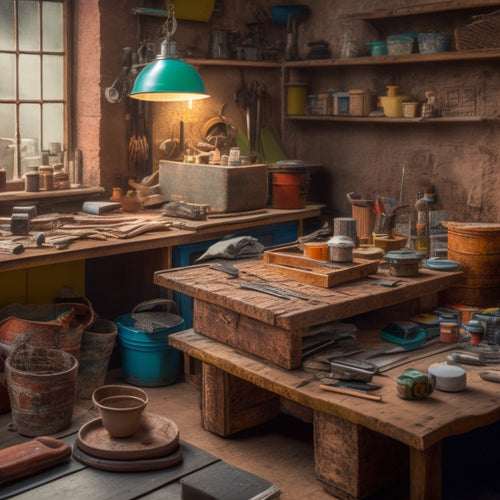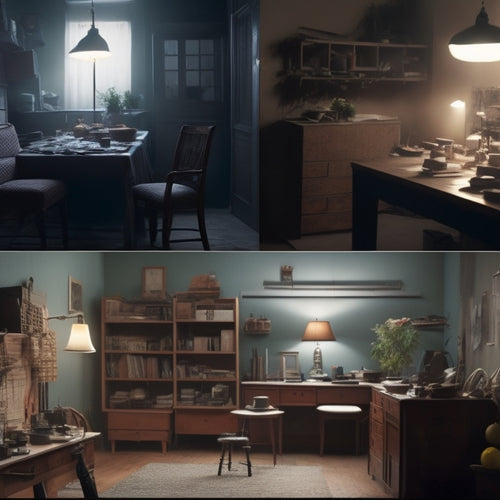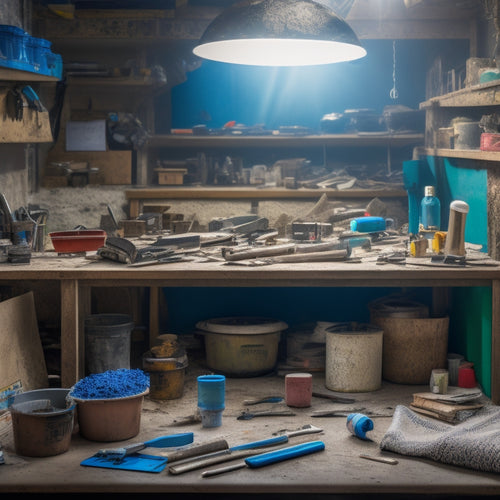
5 Best Tools for Small-Scale Home Renovation Projects
Share
You'll need the right tools to tackle a small-scale home renovation project efficiently and effectively. For concrete finishing, invest in a tamping tool, edger, and float for a smooth finish. High-quality hand tools like a trowel, straightedge, and flexible finishing blade will help you achieve a professional look. When it comes to edging, an oscillating multi-tool, dedicated edger, and angle grinder are must-haves. Additionally, don't forget essential accessories like a bull float, jointer, and finishing broom. With these tools, you'll be well on your way to a successful renovation - and there's more to explore when it comes to specialty tools and techniques that can take your project to the next level.
Key Takeaways
• Invest in a high-quality trowel for smooth concrete finishes and precise material application.
• A dedicated edger provides high control and accuracy for clean lines and edges.
• An oscillating multi-tool is ideal for tight spaces and corners, perfect for small-scale renovations.
• A bull float is essential for flattening and leveling concrete surfaces, ensuring a professional finish.
• A finishing broom adds texture and pattern to concrete surfaces, enhancing the aesthetic appeal of small-scale projects.
Essential Concrete Finishing Tools
When working on small-scale home renovation projects, you'll likely need to finish concrete surfaces, and having the right tools for the job is essential. Make sure you have a tamping tool, edger, and float in your arsenal. These tools will help you achieve a smooth, even finish, which is vital for both functional and aesthetic reasons.
For a professional-looking finish, you'll want to master various concrete curing methods, such as applying a curing compound or using a wet-cure method. Additionally, you may want to explore decorative concrete techniques, like stamping or staining, to give your concrete surfaces a unique look.
With the right tools and techniques, you'll be able to achieve a high-quality finish that will enhance the overall appearance of your renovated space. Remember to always follow safety guidelines when working with concrete, and don't hesitate to seek guidance if you're unsure about a particular process or technique.
Top Hand Tools for Smoothing
To guarantee a smooth, even finish, you'll need to invest in a set of high-quality hand tools, including a trusty trowel, a precision straightedge, and a flexible finishing blade, each designed to tackle specific tasks in the smoothing process.
These hand tools are essential for mastering various smoothing techniques, from applying thin layers of compound to feathering out edges. Your trowel will be your go-to tool for applying and spreading materials, while your straightedge guarantees straight lines and even surfaces. The flexible finishing blade is perfect for reaching tight spaces and corners, allowing you to achieve a seamless finish.
To get the most out of these tools, remember to prioritize tool maintenance. Regularly clean and dry your tools to prevent rust and damage, and store them in a secure location to avoid misplacement.
Best Power Tools for Edging
You'll take your smoothing skills to the next level by incorporating power tools that excel at edging, specifically designed to tackle areas where precision and control are paramount. These tools will help you achieve professional-looking results, even in tight spaces and corners.
To get the most out of your edging projects, consider the following power tools:
-
Oscillating Multi-Tool: Ideal for tight spaces and corners, this tool offers versatility and precision.
-
Edger: A dedicated power tool for edging, providing a high level of control and accuracy.
-
Router: Perfect for creating decorative edges and profiles, with various bit options available.
-
Jigsaw: Great for curved cuts and intricate edges, offering more control than traditional saws.
-
Angle Grinder: A heavy-duty option for removing old adhesives, mortar, or concrete, preparing surfaces for new edges.
When choosing the best power tool for edging, read power tool reviews and consider your specific project needs.
Practice edging techniques to master the art of precision control, and you'll be amazed at the results you can achieve.
Must-Have Concrete Finishing Accessories
Concrete finishing requires more than just power tools, and that's why it's vital to have the right accessories on hand to achieve a professional-looking finish. As you tackle your DIY concrete projects, you'll need to guarantee you have the necessary tools to get the job done. When it comes to concrete texture techniques, having the right accessories can make all the difference.
Invest in a quality trowel, which is essential for smoothing out the concrete surface. A bull float is another must-have, allowing you to flatten and level the concrete.
For more precise control, use an edger to create clean lines and edges. Don't forget a jointer, which helps to create expansion joints in the concrete. A finishing broom is also a great addition, allowing you to add texture and pattern to your concrete surface.
With these accessories in your toolkit, you'll be well on your way to achieving a professional-looking finish for your DIY concrete projects.
Finishing Touches With Specialty Tools
Specialty tools take your DIY concrete projects to the next level, allowing you to add intricate details and unique textures that elevate the overall aesthetic. With these tools, you can experiment with various decorative techniques and surface treatments to create a one-of-a-kind look.
Here are some essential specialty tools to evaluate:
-
Stamping tools: Create intricate patterns and designs on your concrete surface with these versatile tools.
-
Texture mats: Add unique textures to your concrete with these mats, which come in a variety of patterns and designs.
-
Stencils: Use stencils to add logos, designs, or patterns to your concrete surface with precision and accuracy.
-
Engraving tools: Engrave designs, patterns, or text onto your concrete surface with these specialized tools.
-
Coloring tools: Add a pop of color to your concrete with these tools, which allow you to incorporate different hues and shades into your design.
Frequently Asked Questions
How Do I Protect My Floors From Damage During Renovation?
You're smart to think about protecting your floors from damage during renovation.
Start by covering high-traffic areas with durable, waterproof floor covering options like plastic sheeting or tarps.
For added protection, lay down protective mats at entrances and in front of workstations. These will catch dirt, dust, and debris, preventing scratches and stains.
Don't forget to secure them with tape to prevent slipping and sliding.
What Safety Gear Do I Need for Concrete Finishing Projects?
When working on concrete finishing projects, you'll need essential safety equipment to protect yourself from harsh materials and techniques.
You're handling concrete, so you'll want to wear long sleeves, gloves, and safety glasses to prevent skin and eye irritation.
Don't forget a dust mask or respirator to avoid inhaling concrete dust.
For added protection, consider knee pads and steel-toed boots.
With these essentials, you'll be well-equipped to tackle concrete finishing techniques like grinding, polishing, and finishing with confidence.
Can I Rent Concrete Finishing Tools Instead of Buying Them?
Did you know that 75% of DIYers regard tool rental as a cost-effective solution?
You're wise to contemplate renting concrete finishing tools instead of buying them.
Concrete tool rentals offer a range of finishing tool options, from tamping rakes to screed boards, at a fraction of the cost.
This way, you'll have access to the right tools without breaking the bank.
Plus, you won't have to worry about storage or maintenance, giving you more control over your project.
How Do I Dispose of Leftover Concrete and Materials?
You'll need to dispose of leftover concrete and materials responsibly.
Start by separating concrete from other materials like wood, metal, or drywall.
Look into local concrete disposal services or recycling options, such as concrete crushing facilities, that can turn your waste into reusable aggregate.
You can also check with your local government for guidelines on disposing of construction materials.
Make sure to follow all regulations to avoid fines and minimize environmental impact.
Do I Need a Permit for Small-Scale Home Renovation Projects?
As you commence your home renovation journey, don't let permit requirements be a dark cloud looming over your project.
You're not necessarily off the hook, but you might be surprised to find that not all small-scale projects require a permit.
Check with your local government to determine if your renovation plans fall under their radar.
Typically, permits are needed for structural changes, electrical or plumbing work, or if you're making significant alterations to your home's footprint.
Conclusion
You've made it to the final stage of your small-scale home renovation project. The finishing touches are within your grasp, but don't think you're done yet.
The last details can make or break the entire look. Will you settle for mediocre or aim for perfection? The fate of your newly renovated space hangs in the balance.
With the right tools from this list, you'll be one step closer to achieving that flawless finish. Now, go forth and finish what you started!
Related Posts
-

Budget-Friendly Materials for Your Home Renovation Project
As you plan your home renovation project, finding budget-friendly materials is key to turning your design vision into...
-

3 Best DIY Home Renovation Timelines for Success
As you tackle your DIY home renovation project, create a solid timeline by breaking it down into three phases. First,...
-

Get Discounted Plastering Tool Sets for DIY Renovations
You can find discounted plastering tool sets online, at local hardware stores, and thrift stores, offering a range of...


